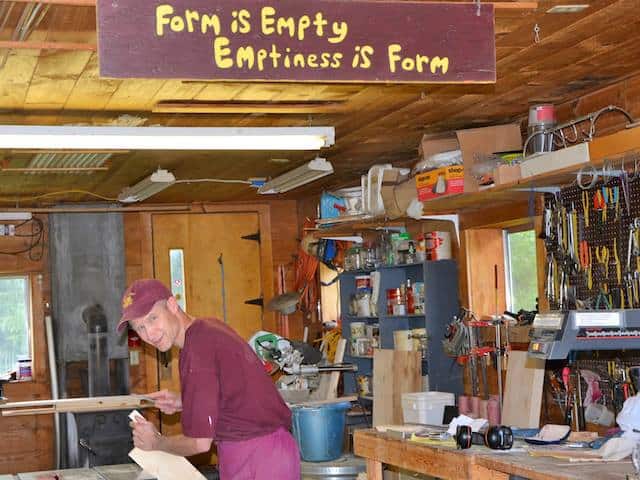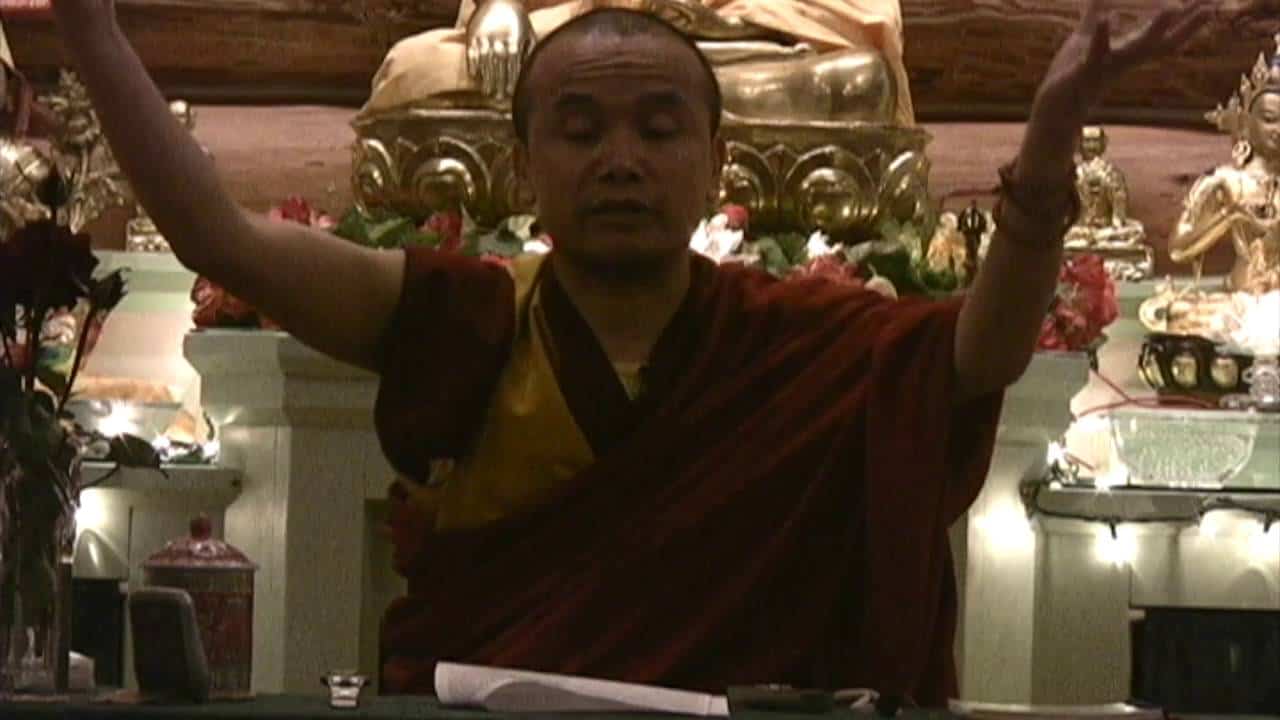Verse 15-4: Wisdom in benefitting others
Part of a series of talks on the 41 Prayers to Cultivate Bodhicitta from the Avatamsaka Sutra (the Flower Ornament Sutra).
- Balance sitting practice and active practice
- Benefit sentient beings in a wise way, at the level that we’re currently at
41 Prayers to cultivate bodhicitta: Verse 15-4 (download)
We’re still on the 15th one:
“May I plunge into cyclic life for the sake of all beings.”
This is the prayer of the bodhisattva when going down a staircase.
Fortunately we have stairs here. In the new monastic residence we have stairs. I guess you can do the same thing going down the ladder when you’re oiling the barn. Really be aware when we’re doing that physical movement with our body to try and think in that way.
To me when it says “plunge….” Plunge implies some kind of eagerness, doesn’t it? It’s really eager to benefit sentient beings. This again is a change in our mind, because sometimes we’re not so eager. We really want people to leave us alone. We’d much prefer just to sit in our room and meditate on compassion for them, but they’re really kind of a nuisance and interfere with our meditation sometimes, don’t they? So this is one mind that we have to overcome and to really think, whoever is in front of our face at any particular moment is our Dharma practice, is the field of our love and compassion, is the representative of all sentient beings that we practice with.
Now when we’re talking here about benefiting sentient beings, so often we get the idea that it means physically doing something. It’s like, “Okay I’ve got to go out and become a hospice volunteer and then I’ve got to work for Al Gore and then I’ve got to do this and I’ve got to do that.” We get all in this frenzy of “I’ve got to do so many things.” We have to really create a balance in our lives, a balance between our practice. Our whole life should be practice, but between the formal sitting practice and our active practice to make sure we have a real balance.
If we go a lot to the sitting side when we’re not really ready, then we could waste a lot of time because our mind, instead of meditating, is involved in distractions. In which case it’ll be much more useful sometimes to do purification practices or to do more active things to accumulate merit so that when we sit we have more concentration. That doesn’t mean you don’t sit at all and you run around all day and you be active. It just means don’t get fancy ideas that you’re going to go live in a cave and meditate 24-7 when you can’t even sit still for half an hour now. I’ve noticed people tend to be real extremist and I say something and they like go “boing” clear to the opposite side, and that’s not it. So it’s just how you balance your formal sitting practice and your active life.
If we go too much to the activity, then sometimes our mind gets uncontrolled and we wind up thinking in ways that are not very compassionate at all, because we start having our own agenda and all these people that we’re helping, gee they should receive our help and be appreciative, and they should recover and do this and that and that. And then we get frustrated and sometimes angry. So that’s if we go too much to the service side. So that doesn’t mean we don’t do any service and all we do is meditate. We’re talking about balance here.
Create a balance in our lives, where we have enough quiet time where we can really look at our mind in a very very deep way and we have enough active time to see that what we’re doing in our meditation session is having an effect in terms of our daily actions. And then through our daily actions, we get some feedback, “Well, how well am I doing? In this area my meditation is ok but in this area, you know, my equanimity is not so good, I have a lot of judgement going on in my mind, so I really need to work on that in my practice.”
Whatever it is, when we’re plunging into cyclic existence to benefit sentient beings, to do it in a wise way, at the level that we’re currently at, knowing that level will change and at a balanced way, where we’re at now. Also knowing that the balance is going to change. So it’s not that we find one level or one balance and then we stay there for the next three countless great eons. For the next, sometimes it’s a week, and then we have to adjust the balance. In other areas of our practice, it’s a few months, or a year or a lifetime. But we always have to get a feel for where we’re at and what’s the most conducive way in the big picture to really be of the most benefit. And sometimes being of the most benefit means taking a break and really working on our mind a lot.
It’s kind of like somebody who wants to be a doctor, you can’t just go out and start treating people, you have to go to school first. While you’re in school maybe you can’t treat a whole lot of people, but that’s giving you the time to get the education so that when you get your MD then you can actually be of more benefit. So it’s this way of finding a balance according to where we’re at, at any particular time but always with the motivation of how can I benefit all sentient beings, which means including ourselves. It’s not all other sentient beings but not me, it’s everybody.
Venerable Thubten Chodron
Venerable Chodron emphasizes the practical application of Buddha’s teachings in our daily lives and is especially skilled at explaining them in ways easily understood and practiced by Westerners. She is well known for her warm, humorous, and lucid teachings. She was ordained as a Buddhist nun in 1977 by Kyabje Ling Rinpoche in Dharamsala, India, and in 1986 she received bhikshuni (full) ordination in Taiwan. Read her full bio.


